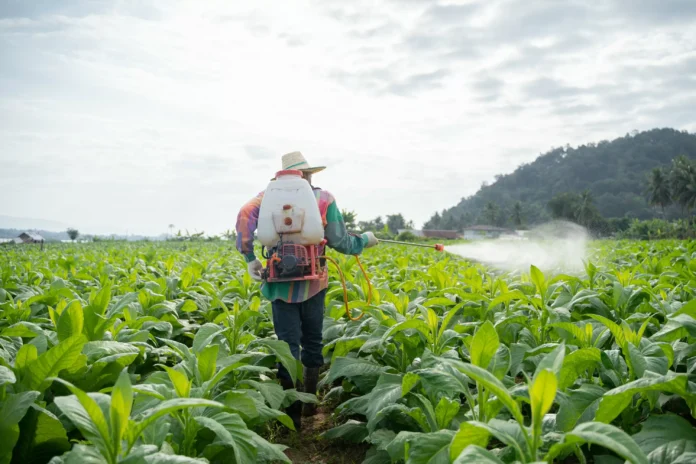Toxic ‘Forever Chemicals’ Used in U.S. Pesticides: A Growing Threat to Human Health
Pesticides are a common sight in the agricultural industry, used to protect crops from pests and increase yields. However, a recent study has shed light on the increasing use of toxic ‘forever chemicals’ in these pesticides, posing a serious threat to human health. These chemicals, known as per- and polyfluoroalkyl substances (PFAS), have been found to contaminate waterways and are being sprayed on staple foods, putting our health at risk.
The study, conducted by the Environmental Working Group (EWG), analyzed samples from 10 states and found that PFAS were present in more than half of the tested fruits and vegetables, including strawberries, spinach, and lettuce. These chemicals were also found in over 70% of the tested drinking water samples. This is a cause for concern as PFAS are known to be harmful to human health, with links to various health issues such as cancer, reproductive and developmental problems, and immune system dysfunction.
So, what exactly are PFAS and why are they a cause for concern? PFAS are a group of man-made chemicals that have been used in various consumer products for decades due to their water and stain-resistant properties. They are also commonly used in firefighting foams, non-stick cookware, and food packaging. However, the chemical bonds in PFAS make them resistant to breaking down, earning them the nickname “forever chemicals”. This means that once released into the environment, they can persist for years, contaminating water sources and accumulating in the food chain.
The use of PFAS in pesticides is a relatively new development, with the EPA approving their use in 2019. This decision was met with widespread criticism, with environmental groups and health experts voicing their concerns over the potential risks to human health. However, the EPA claims that the amount of PFAS used in pesticides is minimal and does not pose a significant risk. But the recent study by EWG paints a different picture.
The fact that PFAS are being sprayed on staple foods is particularly alarming. As these chemicals are water-soluble, they can easily leach into the soil and contaminate groundwater. This contaminated water is then used to irrigate crops, leading to the accumulation of PFAS in fruits and vegetables. This poses a serious health risk, as these foods are consumed by people of all ages and can lead to long-term exposure to PFAS.
Moreover, the presence of PFAS in drinking water is a major concern. The EWG study found that 43 out of 44 tested cities had detectable levels of PFAS in their drinking water. This means that millions of people are unknowingly exposed to these chemicals every day, putting their health at risk. And the worst part? There are currently no federal regulations for PFAS in drinking water. This means that there is no legal limit for the amount of PFAS allowed in our drinking water, leaving us vulnerable to their harmful effects.
The use of PFAS in pesticides not only poses a threat to human health but also has a significant impact on the environment. These chemicals have been found to be toxic to aquatic life, leading to the death of fish and other aquatic organisms. They also contribute to the contamination of our waterways, making it unsafe for both humans and wildlife.
So, what can be done to address this issue? The first step is to raise awareness about the dangers of PFAS and their presence in our food and water. We must also demand stricter regulations from the EPA to limit the use of PFAS in pesticides and set safe limits for their presence in drinking water. Additionally, farmers can switch to safer and more sustainable methods of pest control, reducing the need for harmful chemicals.
In conclusion, the use of toxic ‘forever chemicals’ in U.S. pesticides is a growing threat to our health and the environment. The presence of PFAS in our food and water is a cause for concern and requires immediate action. It is time for the government to prioritize the health and well-being of its citizens and take concrete steps to limit the use of PFAS in pesticides. We must also educate ourselves and make informed choices about the food we consume, to protect ourselves and our families from the harmful effects of these chemicals. Let us work together towards a healthier and safer future for all.


